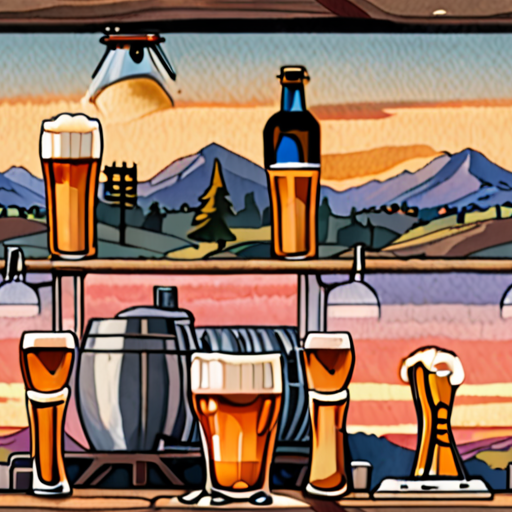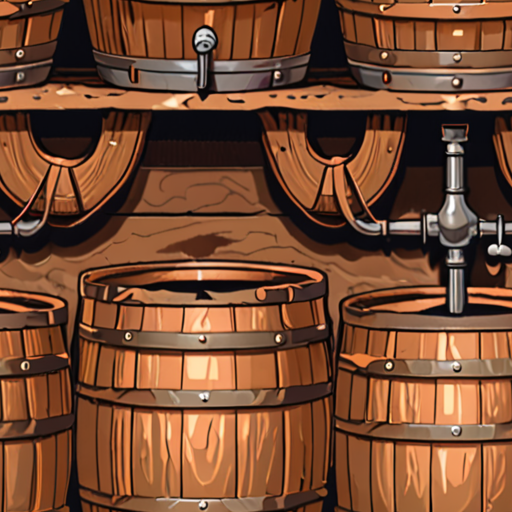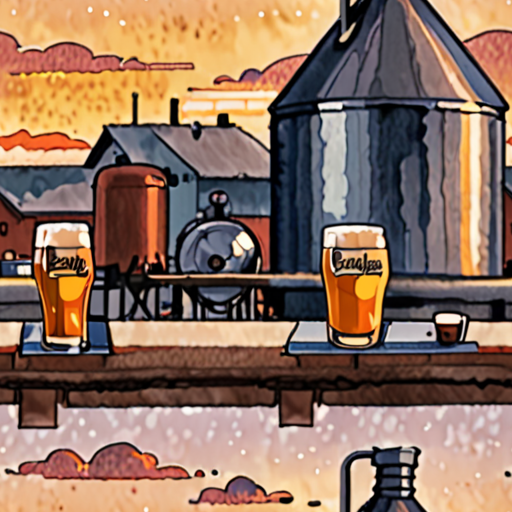The art of brewing has been perfected over centuries, but maintaining the quality of beer requires dedication and expertise. For brewers and brewery enthusiasts alike, understanding the intricacies of beer maintenance is crucial to producing exceptional craft beers. From ensuring cleanliness and preventing contamination to optimizing equipment performance and minimizing costs, mastering beer maintenance is essential for any serious brewer. Whether you’re a seasoned professional or just starting out, staying up-to-date on the latest techniques and best practices can elevate your brewing game and take your passion to new heights.

How to Maintain Beer
As a craft beer enthusiast, I understand the importance of storing and maintaining beer to preserve its flavor and aroma.
- Temperature Control
- Light Protection
- Humidity Control
- Upright Storage
- Minimize Movement
- Cleanliness
Beer should be stored at a consistent temperature between 45°F and 55°F (7°C and 13°C). This temperature range slows down the aging process and prevents off-flavors from developing.
Direct sunlight can cause beer to degrade quickly, so store it away from windows and use UV-blocking glassware or bottles to protect against light exposure.
Avoid storing beer in humid environments, as moisture can seep into the packaging and affect the beer’s quality.
Keep bottles and cans upright to prevent sediment from settling and affecting the beer’s taste.
Reduce movement and vibrations when transporting or storing beer to prevent damage to the packaging and potential contamination.
Maintain a clean storage environment to prevent dust, dirt, and other contaminants from affecting the beer’s quality.
By following these guidelines, you’ll be able to enjoy your favorite beers at their best and appreciate the nuances of different brews.
Recommended Storage Options
Consider investing in a beer fridge or a temperature-controlled storage unit specifically designed for beer storage.
Additional Tips
When purchasing beer, check the packaging for any signs of damage or tampering before consuming.
Always store beer in a cool, dark place, away from strong-smelling foods and chemicals.
Monitor the beer’s condition regularly and discard it if you notice any off-flavors, odors, or visible signs of spoilage.
How Long Is Beer Okay to Drink?
When it comes to beer shelf life, many people wonder how long it remains safe to consume.
- The general consensus is that beer can remain drinkable for up to two years if stored properly.
- However, factors such as storage conditions, packaging, and handling can significantly impact its longevity.
Factors Affecting Beer Shelf Life:
- Storage Conditions: Beer should be kept in a cool, dark place, away from direct sunlight and heat sources.
- Packaging: Bottles, cans, and kegs can affect beer’s exposure to light, oxygen, and contaminants.
- Handling: Improper handling, such as excessive shaking or exposure to extreme temperatures, can compromise beer’s quality.
Signs of Spoilage:
- Off Smells: A sour or unpleasant odor may indicate spoilage.
- Cloudy Appearance: Hazy or cloudy beer can be a sign of contamination or oxidation.
- Taste: Beer that tastes sour, bitter, or unpleasantly sweet may have gone bad.
Best Practices for Storing Beer:
- Refrigerate Beer: Store beer in the refrigerator to slow down degradation.
- Keep Beer Away from Light: Darkness helps prevent light-induced damage.
- Monitor Temperature: Store beer between 40°F and 50°F (4°C and 10°C) to prevent temperature-related issues.
Conclusion:
While beer can remain drinkable for up to two years under optimal conditions, it’s essential to monitor its quality and take steps to preserve its freshness.

Beer Line Cleaning Frequency
We recommend cleaning beer lines every 7 to 14 days, depending on usage and type of establishment.
-
Factors Affecting Cleaning Frequency:
- Usage: High-volume establishments may require daily cleaning, while low-volume ones can go longer between cleanings.
- Type of Establishment: Bars and restaurants serving a variety of beers may need to clean lines more frequently than those offering a limited selection.
- Line Material: Lines made from certain materials, such as stainless steel or silicone, may require less frequent cleaning than those made from copper or brass.
-
Cleaning Methods:
- Hot Water Rinse: Use hot water to rinse the lines, followed by a sanitizing solution.
- Sanitizing Solution: Mix a sanitizing solution according to the manufacturer’s instructions and pump it through the lines.
- Enzyme-Based Cleaner: Use an enzyme-based cleaner to break down protein residue and other debris.
-
Importance of Regular Cleaning:
- Prevents Contamination: Regular cleaning prevents contamination of beer and equipment.
- Ensures Quality: Clean lines ensure the quality of beer served to customers.
- Reduces Maintenance: Regular cleaning reduces maintenance costs and downtime.

Is Washing Hair with Beer Good?
Washing your hair with beer has been touted as a potential hair care remedy, with proponents claiming it can strengthen and nourish your locks.
- The idea behind using beer as a hair wash is that its antioxidants and yeast can help repair damaged hair cuticles and promote healthy growth.
- However, there is limited scientific evidence to support these claims, and many experts remain skeptical about the effectiveness of beer as a hair wash.
Risks and Considerations
While beer may seem like a harmless ingredient, there are several risks and considerations to keep in mind:
- Sensitivity and Allergic Reactions : Some people may be allergic to beer or experience sensitivity reactions, which could lead to skin irritation, itching, or redness.
- Unbalanced pH Levels : Beer has a relatively high pH level, which could disrupt the natural pH balance of your scalp and cause irritation or dryness.
- Lack of Nutrients : While beer contains some nutrients, it lacks essential vitamins and minerals necessary for healthy hair growth.
Alternatives to Beer-Based Hair Care
If you’re looking for a natural hair care solution, consider these alternatives:
- Coffee Grounds**: Coffee grounds can help stimulate blood flow and reduce dandruff, making them a popular choice for hair care.
- Aloe Vera**: Aloe vera is rich in vitamins and minerals that can help soothe and moisturize your scalp, promoting healthy hair growth.
- Olive Oil**: Olive oil is a natural moisturizer that can help hydrate and protect your hair, leaving it soft and manageable.
Conclusion
In conclusion, while beer may seem like a promising hair care solution, there is limited scientific evidence to support its effectiveness, and several risks and considerations should be taken into account. If you’re looking for a natural hair care solution, consider trying coffee grounds, aloe vera, or olive oil instead.
Why People Wash Their Hair with Beer
The idea of washing hair with beer may seem unusual, but it has been practiced for centuries.
- One theory behind this practice is that the proteins present in beer can bind to damaged hair, restoring its strength and body.
- Another benefit associated with beer-washing is its potential to reduce dandruff, cure an oily scalp, minimize hair loss, and promote overall scalp health.
In the past, people believed that beer had antiseptic properties, which could help to clean and soothe the scalp.
- Beer was often used as a hair treatment due to its perceived ability to nourish and moisturize the hair and scalp.
- Some individuals even claimed that beer could help to remove product buildup and impurities from the hair.
While there is limited scientific evidence to support these claims, many people swear by the benefits of beer-washing their hair.
However, it’s essential to note that beer is not a suitable substitute for regular shampoo, and its effectiveness as a hair treatment remains largely anecdotal.
For those looking to try beer-washing, it’s recommended to start with small amounts and gradually increase the frequency and quantity as needed.
As with any hair treatment, it’s crucial to monitor the results and adjust accordingly to avoid any adverse effects.
Ultimately, whether or not beer-washing works for individual hair types and needs remains to be seen, but it’s certainly an interesting and unconventional approach to hair care.

Which Beer Is Best for Hair?
The age-old question of whether beer can benefit our locks has sparked debate among beer enthusiasts and hair care aficionados alike.
- The idea behind using beer for hair care stems from its potential moisturizing properties, which could help to hydrate and nourish dry, damaged hair.
- However, not all beers are created equal, and some may be better suited for hair care than others.
Alcohol-Free Beer: A Game-Changer for Hair Care?
One type of beer that stands out as a potential game-changer for hair care is alcohol-free beer.
- As the name suggests, alcohol-free beer contains little to no alcohol, making it a safer choice for those looking to use beer for hair care.
- This type of beer still retains many of the beneficial properties found in regular beer, including antioxidants and vitamins.
The Benefits of Using Beer for Hair Care
So, what exactly makes beer a good choice for hair care?
- Beer contains a number of nutrients and compounds that can help to promote healthy hair growth, including vitamin B, iron, and silicon.
- These nutrients can help to strengthen hair follicles, reduce dandruff and itchiness, and even promote shine and luster.
How to Use Beer for Hair Care
If you’re considering giving beer a try for hair care, here are a few tips to keep in mind:
- Start by using a small amount of beer as a hair mask, leaving it on for 15-30 minutes before rinsing.
- You can also add beer to your shampoo or conditioner for an extra dose of moisture and nourishment.
Conclusion
In conclusion, while there’s no definitive answer to which beer is best for hair, alcohol-free beer stands out as a promising option due to its moisturizing properties and lack of harsh chemicals.
By incorporating beer into your hair care routine, you may be able to reap a number of benefits, including stronger, healthier-looking hair and a reduced risk of damage and breakage.

0 Comments